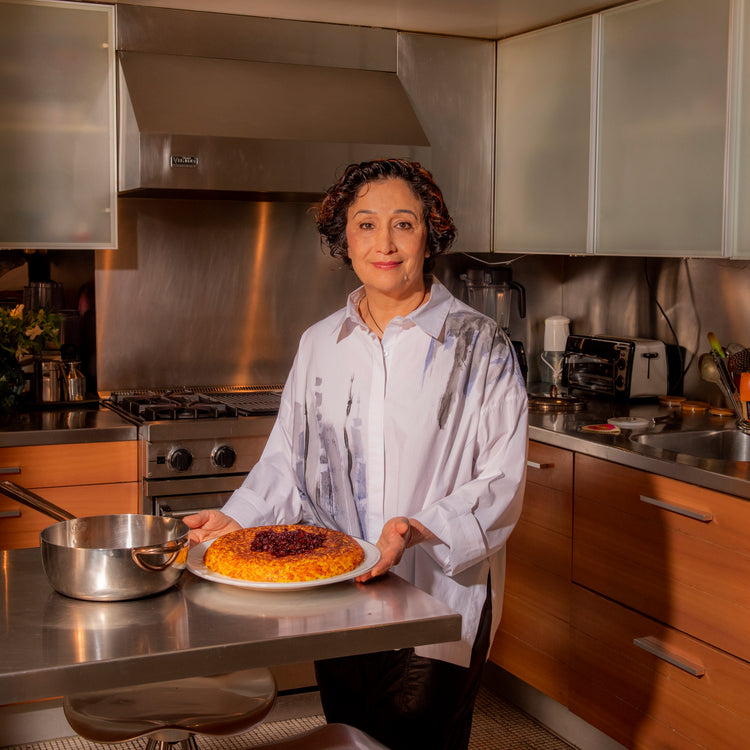I was very young, maybe 10 or 11, and would help my mother with her pickling and jamming projects in the summer, and I loved it. My mother very early on realized my passion for food and was happy to encourage it. By the time I was 14 or 15 I was full-on cooking. My mother would allow me to cook for special parties and events. She was hosting all the time and needed extra help, so she would allow me to make a dish or two. She would always say, “Nasim made this,” and was very encouraging.

When I came to this country the first money I had I used to buy a cheap pot and pan, and I would cook on this single burner in my tiny room. Even right now, even though I have a restaurant, some nights I go home and make myself a simple meal. I eat very simply and very clean, but I always cook. I always have bread, pickles, yogurt, cucumber, avocado, and rice at home. I can make it so quickly; either I’ll fry an egg with yogurt and saffron, make a big salad, or yogurt with cucumber. I get home around nine o’clock at night, so I don’t make something elaborate — just something simple and delicious.

Today I’m not in the restaurant as intensely as I was for four years, but I enjoy cooking in my home. When I am in the restaurant I cook different steps of a meal. I have a team, we interact, and food goes to the service area. At home I cook from the beginning to the end. I do it all by myself. It’s a meditation ritual. I get my vegetables, and it’s a manageable half a pound. I prepare them and plate them all myself, and it’s very satisfying. Cooking at the restaurant is also very satisfying, but at this point, I’m spoiled — I need both.
At home I cook from the beginning to the end. I do it all by myself. It’s a meditation ritual.

I’m always happy with my bread, cheese, and yogurt, but I am who I am because I love to cook and feed others. I need an audience. Now I have an incredible audience who come every night to the restaurant. They always thank me, but I tell them, “You have no idea what you have done for me.” If I didn’t have this purpose to get up every day I don’t know what I would do. It’s what excites me.
If I didn’t have this purpose to get up every day I don’t know what I would do.

I’ve had many careers; I had a business, a print shop, and was successful. I had all kinds of odd jobs when I was a student here; I did volunteer work for the UN, but throughout all of these many lives, cooking was what kept me happy and on my toes. I knew it from the beginning. In my early 30s I would always say to my husband, “When are we going to open a restaurant?”
But I was always doing other things, and then I had my children.

When my twins were born cooking became a massive project. As they got older, I started taking on charity work, but nothing was as satisfying. I turned to cooking and catering their events. I quickly realized I could do more, and I started taking on cooking more seriously. It took 25 years, but it was always in the back of my head.
When my kids were in middle school I knew they would go to college — and I’m an active person — I thought, What am I going to do? This was when I announced to my husband, “I’m going to look for a building and open a restaurant.” That’s when I started aggressively looking for a restaurant. I took some seminars that gave me a lot of perspective on how hard it is. But I didn’t listen to that, and by the time my kids went to college we got the building. I took cooking more seriously and started working with young chefs — whoever let me intern with them.

The construction and permits took six years, and eventually we opened in June of 2018. Sofreh is an extension of who I am. My house is similar to Sofreh; it’s very white and minimal. My whole philosophy is that if I’m cooking I’ll serve my food in the most simple way to allow it to shine. I also wanted the restaurant to be a peaceful, clean space. In New York people come out of the subway, and there’s noise and chaos; I just wanted the restaurant to be a peaceful space. I have a creative director who was my friend for many years, and we had the same vision. We had six years of a delay, so we had time to go over every detail. We had the opportunity to make everything so personal.
In New York people come out of the subway, and there’s noise and chaos; I wanted the restaurant to be a peaceful space.

These days, many people are obsessed with something Persian called tahdig. It’s the crispy rice at the bottom of the pot. There are so many variations, but the one I made today is an iconic dish made with yogurt and saffron. Both of these items are very dear to me. First of all, I always make my own yogurt — all throughout my life. We make our yogurt at Sofreh, and there’s nothing like fresh yogurt. Saffron is the most precious spice in the world: 80 to 90% of saffron is produced in Iran. It’s my love for rice, yogurt, and saffron. Typically this rice is stuffed with chicken or lamb inside, but I wanted to mix things up. I made chicken with turmeric and saffron in Saucy. I loved using Saucy and Large Fry. Both are so easy to use. I usually cook with only stainless steel and have one nonstick for special occasions.
First of all, I always make my own yogurt — all throughout my life.

I have a café under my name, Sofreh Cafe, and I would love to have more cafés. I want to bring the concept of tea to more mainstream audiences. The tea we make is a different tea than when people drink tea bags. People from the Middle East, Turkey, and Iran know this tea I’m talking about; the rest of the world doesn’t.

I also have a book coming out in nine months. I love pickling and jamming; those were my first two loves. The process of preserving something was fascinating to me. Playing with that word, though, I wanted to pursue the culture. I’m a cook, and by practicing that every day I’m preserving my culture. That’s what the book is about. My history and culture where I come from and who I have become. I stay true to the traditions of Iranian home cooking and stay authentic to how I know Iranian cooking.
I’m a cook and by practicing that every day I’m preserving my culture.























